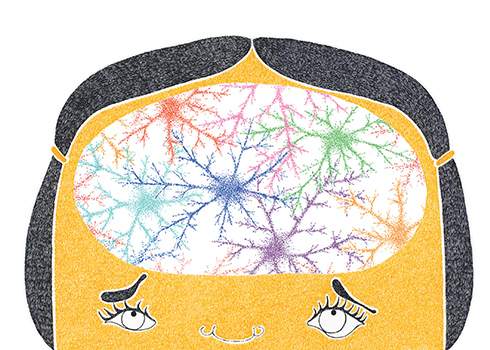Which do we respect more, the brain or the mind?
That may seem like a silly question, since by all expert accounts the mind is just what the brain does. The mind is the output—in thoughts, emotions, memories, and desires—of the electrical and chemical activity of the 100 trillion or so synapses in the human brain. So the question is akin to asking which you value more: the cool air that your air conditioner puts out or the unit itself. (I am writing this on a 96-degree day; substitute “warmth” and “radiator” if you are reading this in winter.)
The brain has been cleaning the mind’s clock when it comes to explaining human behavior. And the mind falls further behind with every advance that neuroscience makes in understanding mental phenomena. So as brain biology alone becomes a sufficient way to explain “mental” phenomena, we’ll increasingly face dilemmas that until now have been the province of philosophy more than science.
For example, a few years ago, a middle-aged Virginia man began to amass child pornography and went on to molest his eight-year-old stepdaughter. Arrested and jailed before trial, he began complaining of headaches and vertigo. A brain scan showed a large tumor in the frontal area invading the hypothalamus, a structure that regulates sexual behavior. The man knew what he was doing was wrong, so he had what the law calls “intact capacity and moral knowledge.” But because of the tumor, doctors said, he could not inhibit his deviant behavior.
The tumor was removed, he was acquitted, and his sexual interests returned to normal. But within a few obsessing about underage girls again. A scan revealed that bits of tissue missed in the first operation had again grown into a sizeable tumor. Surgery once again restored him to “normal.” This seems like a simple brain—and nothing-but-brain—explanation.
Now imagine a 29-year-old unemployed college graduate living with his parents who lies in bed much of the day texting friends, playing video games, and checking Facebook. When his fed-up father asks when he plans to look for a job, he says his doctor just gave him bad news: he has a brain aneurysm that has induced lethargy, depression, and an inability to plan, think clearly, and otherwise get his act together. But if surgeons can fix the aneurysm, the son says, he’s sure he’ll turn his life around.
But what if the son just answers: I don’t feel like it. Does that make you feel differently about him?
Most people cut the young man more slack when he has an aneurysm than when he just doesn’t feel like looking for a job. That’s because when it comes to hijacking our free will, we find brain-based explanations—which are physical, specific, and visible (if one opens up the skull of the lazy son or pedophile stepfather)—more persuasive than nebulous mind-based explanations. In numerous studies, respondents say that people are more responsible for their psychological states than for their neurological states. Most absolve someone of responsibility if their choices seem to be dictated by a physical entity such as a tumor or aneurysm. They are less willing, however, to absolve someone of responsibility if their actions are the result of a psychological state, such as lack of motivation or poor executive function.
But the cause of every behavior lies in the brain, even if that cause (an aberrant pattern of activity, a glitch in the wiring) is not as obvious as a tumor. The brain, after all, is the organ of behavior, just as the pancreas is the organ of insulin production.
If we think about psychology differently from neurology, the obvious question arises: what’s going to happen as more and more of what used to be considered psychology is explained in terms of electrical circuits and chemical constituents—in short, as neurobiology? How will we then view what our fellow humans, and we ourselves, do?
Some clues come from experiments at the University of North Carolina, where philosophers presented lazy-sontype scenarios to hundreds of volunteers.
In one version, a middleaged man was said to have constant sexual thoughts about prepubescent boys and frequently watched through the window as a 13-yearold neighbor showered. Researchers told the volunteers he did this because he had Huebner’s delirium, a psychological condition marked by “excessive psychomachinations,” or because he had hermatosomes, a neurological disease in which dendritic hepatocytes have taken over the brain.
In another scenario, a woman ran a red light, either because: a) she was too distracted and depressed by her upcoming divorce to focus on the road, or b) because her sadness about the impending divorce caused her brain levels of dopamine to plummet, choking off oxygen to her visual cortex and causing it to process visual information slowly and inaccurately.
In each case, the conditions were made up (neither Huebner’s delirium nor hermatosomes exist), and the only difference between the explanations is that one was psychological (mind) and the other neurological (brain).
It was found that neurological explanations are more likely than psychological ones to make volunteers say the perpetrator was not to blame. The exception is that people really, really resist excusing a loathsome act such as violence or pedophilia by invoking brain chemistry. That, scholars suspect, is because although we’ve all seen the authoritative-looking brain maps that label the frontal cortex as the site of the executive functions, and the limbic system as the seat of emotions, and so on, most of us hold tight to the idea that there is something else in there that doesn’t appear on the map: a “me.”
The “me” is what English philosopher Gilbert Ryle derisively called “the ghost in the machine,” an entity that somehow stands apart from the messy physicality of the brain and, being disembodied, is more powerful than whatever the brain puts out. That “me” is the ultimate decider, the observer, the entity that can look at the overactivity in the anterior cingulate gyrus that causes obsessive-compulsive disorder and say, Quiet down! Or see the dearth of activity in the medial prefrontal cortex (site of impulse control) right before we do something rash and bark out, Step it up! Shaun Nichols, a philosopher at the University of Arizona, argues that as long as we believe in a “me” standing apart from the brain that scientists are mapping, we “reject the idea that decisions are produced by deterministic mechanisms and processes.” In answer to the question posed by the title of a 2007 book, Did My Neurons Make Me Do It?, we say no.
This is by no means the naive belief of the uninformed. Neuroscientist Michael Gazzaniga of the University of California– Santa Barbara asserts that there is an “undeniable reality that we are responsible agents,” as he put it in his 2011 book, Who’s In Charge? Free Will and the Science of the Brain. There is a “lingering conviction that we humans have a ‘self’ making all the decisions about our actions,” he wrote, and the corollary of that conviction is that this self can step in when we are doing something we shouldn’t and say, Stop!
To be sure, there are countless mental phenomena that neuroscientists can’t explain, such as why feelings feel the way they do and where imagination comes from, and explaining is a far cry from predicting (as it is with weather). But make no mistake: scientists are pinning down the mechanisms for more and more of what we think, feel, and do, and every discovery leaves less room for “me.” Considering how diminished, even appalled, humankind felt when Copernicus shoved Earth from the center of the solar system, one can only imagine how we’ll feel when there’s no “me,” just my brain.
Sharon Begley is the senior health and science correspondent at Reuters, author of Train Your Mind, Change Your Brain, and coauthor with Richard Davidson of The Emotional Life of Your Brain.
This article also appeared in the December 2013 issue of Mindful magazine.






